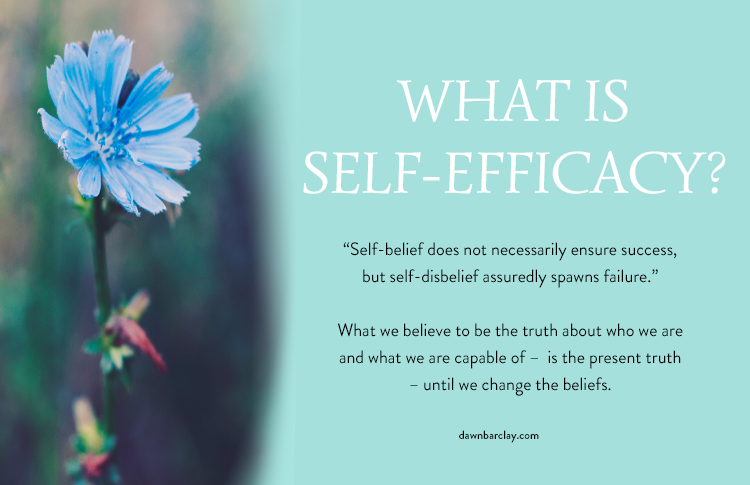
In short,
Self-efficacy is your own belief and judgement in your ability to succeed in a specific situation. It’s not really about your skills and what you know, it’s about your appraisal of your ability in using those skills. Its your belief in yourself: how you think, behave and feel about you.
It’s was the Psychologist Albert Bandura who brought us the term self-efficacy, “the belief in one’s capabilities to organize and execute the courses of action required to manage prospective situations.”
Take two people – one with high self-efficacy and one with low self-efficacy – with the exact same skill set, research has shown that the individual who sees themselves as efficacious will perform better than the person who doesn’t.
Let me rephrase that, the person who believes in their ability will perform better than the person who doesn’t believe in their ability.
It’s the ‘I can try’ v’s ‘I don’t think I can’.
Or the difference between, ‘This is harder than I thought, but I’ll try another way’ to ‘This is too hard, what’s the point’.
Don’t be misled. It’s not a you have it or you don’t, it all depends on the situation.
Unlike confidence and self-esteem which is about you feel about your overall value and worth, self-efficacy is about how you perform certain tasks.
You may have high self-efficacy when you’re doing your job, but you may have low self-efficacy in a new hobby. You could have high self-efficacy in writing and spelling, however that doesn’t mean you have the same self-efficacy when you have to work with numbers.
Maybe you’ve felt low self-efficacy. Perhaps you’ve noticed a time in the past where you avoided something because you thought you would fail anyway. Playing the X-Box with my nieces and nephews is one of mine. In that situation, I’m pretty much Ms Low Self-Efficacy. But they think it’s funny, so I’ll play anyway.
Maybe you’ve noticed someone – perhaps a child – where the displayed high self-efficacy: they stuck at the task, they had problems and difficulties but still the persisted, they put in the effort, didn’t sweat it and faced each challenge as they came along. They expected to do well, but at the same time – which is a massive part of self-efficacy – they also didn’t really mind how things would turn out.
Self-efficacy is all about the task or situation at hand.
Having high self-efficacy doesn’t necessarily mean that you actually will succeed. But low self-efficacy is usually a guaranteed unsuccessful attempt.
“Self-belief does not necessarily ensure success, but self-disbelief assuredly spawns failure.”
From Self-efficacy: The Exercise of Control, 1997
Efficacious people just believe – think, feel, behave – they can do.
What we believe to be the truth about who we are and what we are capable of – is the present truth – until we change the beliefs.
Some of our beliefs we hold so dear and they could be exactly what is holding us back in become more of who we are.
Sometimes we have to question, sometimes we are holding on to beliefs that were ‘hand me downs’ from decades ago and we have just accepted them as true without question their validity or where they came from.
Keep questioning, sometimes you have to put some down in order to pick up new ones.
“By sticking it out through tough times, people emerge from adversity with a stronger sense of efficacy.”
Albert Bandura, From Encyclopedia of Human Behavior, 1994
“People’s beliefs about their abilities have a profound effect on those abilities. Ability is not a fixed property; there is a huge variability in how you perform. People who have a sense of self-efficacy bounce back from failure; they approach things in terms of how to handle them rather than worrying about what can go wrong.”
Albert Bandura, From Self-Efficacy: The Exercise of Control, 1996
Want More?
Self-efficacy is one of the lessons you’ll cover in-depth in The Moxie Project Group Coaching Programme. You’ll spend a lot of the programme questioning your dearly held beliefs that are preventing you from being who know you can be. Self-efficacy is a massive part of making sure you are saying yes to life and the opportunities that are presenting themselves to you. Click here to find out more. The next class starts August 3rd.
Leave a Reply